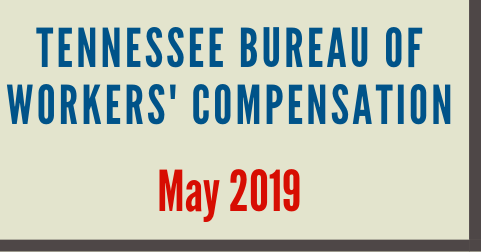Tennessee Bureau of Workers' Compensation

IAIABC: Please provide an organizational profile (number of employees, years in business, where you do business, organizational vision)
 Abbie Hudgens, Administrator, Tennessee Bureau of Workers' Compensation: The Tennessee Workers' Compensation came into existence with the adoption of the Workmen's Compensation Act on April 12, 1919. The name of the Regulatory Agency has changed several times, starting with The Bureau of Workshop and Factory Inspection, then the Division of Workers' Compensation and now the Bureau of Workers' Compensation. The office in Nashville is our headquarters.
Abbie Hudgens, Administrator, Tennessee Bureau of Workers' Compensation: The Tennessee Workers' Compensation came into existence with the adoption of the Workmen's Compensation Act on April 12, 1919. The name of the Regulatory Agency has changed several times, starting with The Bureau of Workshop and Factory Inspection, then the Division of Workers' Compensation and now the Bureau of Workers' Compensation. The office in Nashville is our headquarters.
The Bureau of Workers' Compensation is committed to "fulfilling the promise of workers' compensation...today and tomorrow." This statement conveys that the Bureau will administer and enforce the state's workers' compensation law so that it is construed fairly, impartially, and in ordinance with basic principles of statutory construction.
Our vision, as a regulatory/judicial program is to provide the highest level of services to employees and employers equally, minimize the negative effects of work-related injuries, and strive to establish Tennessee as the best place to work and do business.

IAIABC: What do you see as some of the major challenges the industry is facing, and how can we as a community address them?
 AH: There are a number of challenges that we feel may have an impact on the future of workers’ compensation. One is the changing nature of employment relationships. There is significant interest among employers to utilize “independent contractors” rather than “employees.” That trend poses potential problems in the years to come if these “independent contractors” do not have the resources to provide for income replacement and medical treatment when they are injured.
AH: There are a number of challenges that we feel may have an impact on the future of workers’ compensation. One is the changing nature of employment relationships. There is significant interest among employers to utilize “independent contractors” rather than “employees.” That trend poses potential problems in the years to come if these “independent contractors” do not have the resources to provide for income replacement and medical treatment when they are injured.
Another challenge is to assure adequate access to quality medical care. We must find a way to eliminate some of the frictional costs to physicians who provide services to workers’ compensation patients to encourage more physicians to treat injured workers.
A third challenge is the regulatory complexity that exists in the U.S. due to separate laws and rules in each of the fifty states. We believe that workers’ compensation is appropriately a state program, but the states must find ways to eliminate some of the interstate differences. This would improve the quality of claims adjustment, it would make administration of claims less costly, and it would enhance states’ abilities to compare data and learn from each other.

IAIABC: Are there any projects/programs/initiatives going on at your organization that you are particularly excited or enthusiastic about?
AH: On July 1, 2018 a new law went into effect that authorized our “Next Step Program.” This program connects injured workers who are not able to return to their pre-injury job with a public Tennessee educational institution and monetary resources to acquire the knowledge, skills, and abilities needed to return to meaningful employment if they: (1) have a compensable workers’ compensation claim that occurred on or after July 1, 2018; (2) have a permanent injury with an impairment rating; (3) receive a disability award for not being able to return to work or return to work at a lower pay; (4) plan to train within their abilities. The program provides a benefit that applies to the cost of tuition and mandatory fees of up to $5,000 a year for a maximum of four years.
The Bureau is also involved in a modernization of our IT system that includes and upgrade of EDI to Release 3.1.
We are very pleased to be celebrating our one hundredth anniversary this year. Part of the celebration will be a Gala on June 12 which is the first day of our annual education conference. A lasting part of our celebration will be the publication of A Century of Progress and Perspective: Workers’ Compensation in Tennessee which was developed by a group of dedicated historians in the Bureau.

IAIABC: Why is your organization a member of the IAIABC? What would you tell others about the benefits of membership?
AH: Tennessee is a member of IAIABC for many reasons. We have found IAIABC to be an excellent resource for information on issues of concern to the Tennessee’s workers’ compensation system. In addition we are grateful for the studies that IAIABC has published and will publish in the future. And, of course, IAIABC is the “THE” source of help on EDI which we need and appreciate. Finally, and perhaps, most importantly, is the opportunity that the forum, committee work, and the convention provides to develop relationships with regulators from other states and associate members. These relationships are so valuable both personally and professionally that it is hard to measure their worth.
